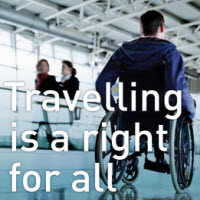Is Brexit good or bad for the rights of disabled people traveling by air?
- Written by Roberto Castiglioni
 Next June 23rd UK voters will go to the polling stations to decide whether their country will stay or leave the European Union.
Next June 23rd UK voters will go to the polling stations to decide whether their country will stay or leave the European Union.
At a time when both Remain and Leave campaigns behave like a bunch of school kids shouting "pants on fire" at each other, I have taken a closer look to understand what could happen to disability rights in air travel if the result of EU Referendum triggers Brexit.
From a technical standpoint, a victory for the Leave campaign would cause the UK to repeal the European Communities Act 1972 that took Britain into the EU.
As a result, thousands of EU regulations, as well as secondary legislation dependent on the European Communities Act, would have to be reintroduced, amended, or simply discarded.
The rule defining the rights of disabled people traveling by air, Regulation (EC) 1107/2006, is one of these laws.
I asked the UK Civil Aviation Authority if Brexit would cause the CAA to abandon the framework of (EC) 1107/2006. “Should the UK decide to leave the EU, any policy issues such as this would be a matter for the Government,” a spokesperson for the Civil Aviation Authority told me.
At first, it may sound as if the Regulator is all but dodging the bullet. In their defence, their role is to enforce the law, whereas the Department for Transport sets the course.
At this stage, I realised people can be better helped reach an informed decision by evaluating if EU law works, or if Brexit would give the UK the opportunity to draft a better set of rights.
For example, if UK voters choose Leave over Remain, Brexit would allow room to draft and adopt new, tougher rules mirroring the  US Air Carrier Access Act.
US Air Carrier Access Act.
“Our focus is not about changing the regulatory framework but improving the way it works to provide better quality and more consistency for travellers who require special assistance,” a spokesperson for the UK largest airline easyjet told me. “Our focus is on supporting the case for the UK to stay in the EU and not speculating about what might happen if the UK votes to leave.”
What about airports? Under EU law, they are responsible for at least 85% of all assistance. Interestingly enough, the second largest UK airport declined to comment. Sometimes silence speaks louder than a thousand words.
With the largest airline determined to make existing laws work better, I turned my questions to a major charity and an accessible tourism advocate.
 “Our main concern is around the enforcement of the current EU framework,” Samantha Fothergill, Senior legal Policy Officer at the Royal National Institute of Blind People (RNIB) said. “The EU rules are reasonably clear but breaches continue to occur and the CAA are either reluctant or unable, under the UK implementing legislation, to take action.”
“Our main concern is around the enforcement of the current EU framework,” Samantha Fothergill, Senior legal Policy Officer at the Royal National Institute of Blind People (RNIB) said. “The EU rules are reasonably clear but breaches continue to occur and the CAA are either reluctant or unable, under the UK implementing legislation, to take action.”
With the CAA knocked down by this uppercut from the RNIB, I asked the charity how they envision the aftermath of Brexit. "We are unable to comment on the pros or cons of Brexit in relation to the application of European Regulations specifically 1107/2006," Samantha Fothergill told me. "If the UK was to vote to leave RNIB would press the UK to implement legislation that would at least mirror if not enhance the current EU Rule."
Last, but not least, I spoke with Martyn Sibley, accessible tourism advocate and founder of Disability Horizons. Following up on the RNIB’s concerns, I asked Martyn if he thinks existing EU legal framework sufficiently safeguards the rights of disabled people traveling by air.
“No, I do not,” Martyn told me. “Too many times I  personally experience and hear stories from the Disability Horizons community about barriers preventing a good flight from happening: uncomfortable equipment, damaged wheelchairs, stressed and ill-equipped staff, miscommunication between airlines and airports. Despite legislation, flying with a disability is still a rollercoaster.”
personally experience and hear stories from the Disability Horizons community about barriers preventing a good flight from happening: uncomfortable equipment, damaged wheelchairs, stressed and ill-equipped staff, miscommunication between airlines and airports. Despite legislation, flying with a disability is still a rollercoaster.”
What if the UK would end up leaving the EU, I asked. “My personal preference is to stay in the European Union for economic, social and security reasons.” He said. “The UK already has the Equalities Act 2010. Therefore, I urge people to use the anti-discrimination legislation already in place.”
I think these replies give readers a clear picture of the state of affairs of the rights of disabled people traveling by air. Existing laws work well, but stakeholders would like the Civil Aviation Authority to be more assertive with airlines and airports.
Nobody seems to think Brexit would be a game changer, but should the UK decide to leave the EU stakeholders would like the UK to retain existing legislation, perhaps following in the footsteps of Norway.
The Kingdom of Norway is not a member of the European Union but voluntarily complies with EU laws and regulations. In July 2013, Norway revised its air travel facilitation regulation tightening European rules. Among the most significant changes, Norway introduced a ban on physically carrying a passenger with reduced mobility on board planes.
At the end of the day, I think the true question is leaving the EU to end up retaining European legislation reason good enough to vote for Brexit? Voters will answer this question on June 23rd.
Will Brexit be good or bad for the rights of disabled people traveling by air? Have your say on our Facebook Page.










